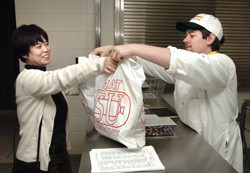Inside Iowa State
Inside ArchivesSubmit newsSend news for Inside to inside@iastate.edu, or call (515) 294-7065. See publication dates, deadlines. About InsideInside Iowa State, a newspaper for faculty and staff, is published by the Office of University Relations. |
May 18, 2006 Got meat?by Erin Rosacker With barbeque season firing up, the Iowa State and Ames communities may not realize that they have an award-winning meat locker right in their own backyard. A trip to Kildee Hall can result in some of the best meat a grill ever met, most likely ISU born, bred and processed. ISU's Meat Laboratory has full capabilities, taking the processing from start to finish and offering the products to the public twice weekly, yearlong. Its retail sales outlet operates from 11 a.m. to 1 p.m. on Wednesdays and Fridays, offering processed meats in addition to frozen packaged cuts. The product supply, which varies as different animals move through the facility, offers pork, beef, lamb and poultry. Get it fastAlthough the retail sales outlet may be the best kept secret in Ames, that doesn't mean you're going to get what you want, when you want it. People are catching on, despite the absence of a marketing budget, and the prices are good enough to earn customer loyalty. 
Hailing Jin, an assistant scientist in the plant sciences institute, picks up her purchase from student Adam Jacobsen. Photo by Bob Elbert. "We're trying to recover as much as we can in value," said meat lab manager Randy Petersohn. "What we find with the prices is that people have to make a special trip in here, sometimes the parking isn't the easiest. So, we tend to under-price a little bit to encourage people to come in." Groups utilize meat lab products as well. The ISU Block and Bridle Club sells summer sausage, the most popular product offered in the retail outlet, as a part of a fund-raiser. ISU Dining features meat lab products in its "Dog Wagon" outdoor grill at the Hub, while events such as Greek Week and the recent state FFA leadership conference used the meat for their cookouts. In addition to the popular summer sausage and the unique Debreczinger specialty sausage, other items are hot commodities. "We make a very lean ground beef, that basically, as soon as we put it in sales, it's gone within a week or less," Petersohn said. This is not weird scienceDon't get freaked out by the word "laboratory." The meat you're buying isn't tampered with or engineered in a super-secret sub-basement facility. This is a teaching lab. How do you think a butcher knows the difference between a pork chop and a pork loin, or how your favorite sausage seems to have the perfect blend of spices? As a federally inspected facility, the meat lab must jump through the requisite hoops to ensure food safety standards. That's good news for consumers. Not only is every animal that goes through the process fully documented, it is inspected before and after slaughter, or "harvest." Neat freaksThe meat lab is an obsessive-compulsive behavioral dream. Donned in white lab coats and the required hair net or cap, anyone going through the processing facility must have their shoes coated with anti-bacterial foam. No chance of transferring cooties by touching the sink controls. Those are operating with a leg control instead of hands. The sanitizers have automatic sensors for hands-free operation and there are basins of boiling water next to sinks for sterilizing equipment. The attention to detail doesn't stop there, however. Machines that check the accuracy of the cooking thermometers get a daily workout, while other equipment analyzes the fat content, or leanness, of the ground meat. Making the most of every animalThe animals that walk through the doors -- literally -- serve more than one purpose, giving many different people the opportunity to study a specific part of the process. A judging or beef production class may take a look at an animal before and after it's harvested; samples of the meat could be studied by food safety students; portions could be used in partnership with a company testing new processing equipment or flavoring ingredients; and class projects could use part of that same animal to develop innovative products or packaging. Any meat that's left over -- which means it wasn't used for any class, project or study -- winds up in the retail outlet. "We try to use the animal in as many ways as possible," explained Extension meat specialist Joe Cordray. "And that's basically trying to be good stewards of the money." Despite being essentially self-supported, the meat lab does not harvest animals for the express purpose of retail sales. "We harvest animals only for our teaching program, our research program," Cordray said. "There might be various types of settings that might be related to nutrition, breeding, study of carcass composition, or judging." The state-of-the-art facilities are used by a wide array of groups, both on campus and in the processing industry. Some of the equipment is specially designed for ISU, thanks to Petersohn and good business relationships cultivated internationally through the short courses offered to those in the industry. Prototypes and loaners also complement the diverse assortment of equipment, earning envy from peers. "When we have smaller plants come and visit us, they do a lot of 'oohing' and 'ahhing,'" Cordray said. |
SummaryThe ISU Meat Lab is a full-service meat processing plant, utilizing as much of each animal as possible. The retail outlet is open twice a week, all year, selling packaged meat to the public. Quote"When we have smaller plants come and visit us, they do a lot of 'oohing' and 'ahhing.'" Joe Cordray |